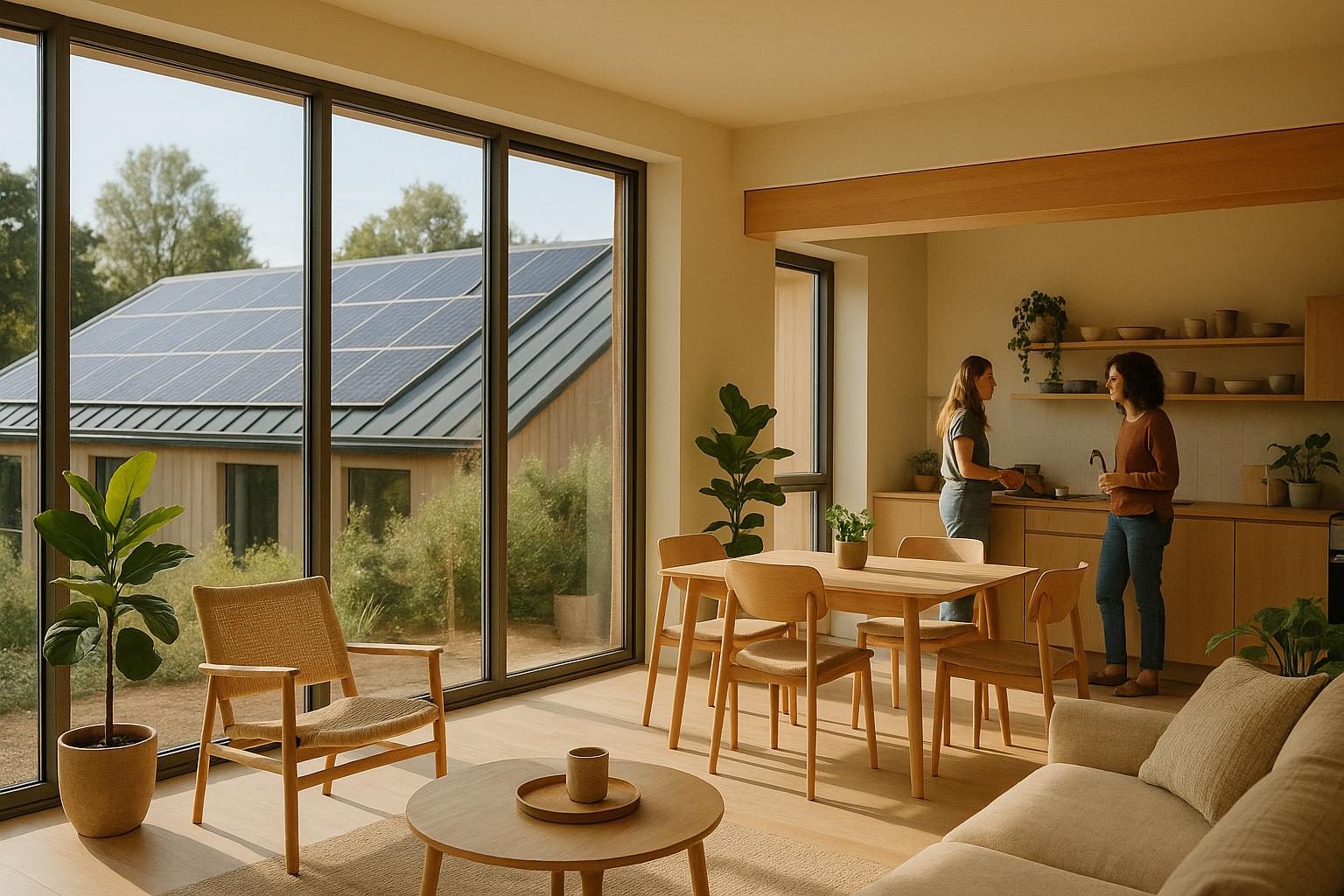Flexible lease policies in coliving offer a modern way to rent, catering to the needs of remote workers, students, and professionals. These leases are short-term, adaptable, and include all essentials like utilities, internet, and furniture in one monthly fee. Here's what you need to know:
- Lease Types: Month-to-month, short-term (1–6 months), and long-term flexible (6+ months).
- Key Benefits: Easy move-in/out, no penalties for early termination, and cost savings of up to 30% compared to traditional renting.
- Amenities: Cleaning services, high-speed Wi-Fi, fully furnished spaces, and shared community areas.
- Who Benefits: Digital nomads, students, expatriates, and anyone seeking flexibility without long-term commitments.
| Feature | Coliving | Traditional Renting |
|---|---|---|
| Lease Terms | Flexible, short-term | Fixed, usually 12 months or more |
| Included Services | Utilities, internet, cleaning | Tenant arranges utilities |
| Flexibility | High, easy to modify or extend | Limited, penalties for breaking |
| Monthly Costs | All-inclusive | Separate bills for services |
Flexible leases are reshaping housing by offering convenience, community, and affordability. Platforms like Coliving.com simplify finding spaces, with transparent pricing and 24/7 support. Whether you need a few weeks or months, coliving adapts to your lifestyle seamlessly.
Key Features of Flexible Lease Agreements
Types of Flexible Lease Options
Coliving spaces provide a variety of lease options designed to fit different lifestyles and needs.
- Month-to-month agreements: These offer maximum flexibility, allowing tenants to move in or out on short notice. Perfect for digital nomads, temporary workers, or anyone with uncertain plans.
- Short-term leases: Typically lasting from one to six months, these are ideal for professionals on temporary assignments, students in short-term programs, or those testing out a new city before committing to a longer stay. While they often come with slightly higher monthly rates, the lack of long-term commitment makes them appealing.
- Long-term flexible leases: Spanning six months or more, these leases strike a balance between traditional annual agreements and short-term options. Many coliving arrangements last 9–12 months but can be extended or ended early without heavy penalties. This setup is especially accommodating for tenants needing flexibility over time.
The growing demand for coliving is evident. In 2022, Savills reported the addition of 2,000 new coliving spaces in the UK, more than doubling the number available earlier in the year. At Dandi Wembley, 59% of residents were new to London, with 35% coming from overseas, highlighting the appeal to both locals and international tenants.
Included Amenities and Services
One standout feature of flexible lease agreements in coliving spaces is their all-inclusive nature. A single monthly payment typically covers utilities, high-speed Wi-Fi, and more, simplifying budgeting for tenants.
Key amenities include:
- Cleaning services for shared areas like kitchens, bathrooms, and lounges.
- Fully furnished spaces, so tenants can move in with just their personal items.
- Community-focused features, such as shared workspaces, lounges, and event areas. Some locations go further, offering perks like fitness centers, rooftop terraces, or game rooms.
Financially, coliving often presents significant savings. For example, near the University of Washington, coliving rents are 25–35% lower than traditional apartments. Around USC, monthly coliving rents typically range from $1,000 to $1,500, making it an attractive option for budget-conscious tenants.
Adjustable Lease Durations
Flexibility in lease duration is another key benefit of coliving arrangements. Unlike traditional leases that bind tenants to rigid terms with steep penalties for early termination, coliving agreements are designed to accommodate life's uncertainties.
- Tenants can extend their stay with as little as 30 days' notice, making it easy to adjust plans.
- Early departure options allow tenants to leave with reasonable notice, avoiding excessive fees.
This flexibility aligns with the needs of modern tenants who value convenience and adaptability in their living arrangements.
When considering a coliving space, it’s wise to review the financial terms, including rent, deposits, and any fees for modifying lease terms. Asking about these details ensures your living arrangement can evolve as your needs change.
Short-Term vs Long-Term Lease Flexibility Comparison
Pros and Cons of Each Lease Type
When deciding between short-term and long-term coliving leases, it's important to weigh their distinct advantages and drawbacks. Here's a quick comparison to help you determine which option suits your lifestyle and goals:
| Feature | Short-Term Lease | Long-Term Lease |
|---|---|---|
| Duration | Few days to 9 months | One year or more |
| Flexibility | High mobility and adaptability | Limited flexibility |
| Monthly Cost | Higher rental rates | Lower payments |
| Commitment Level | Minimal obligation | Greater long-term commitment |
| Stability | Frequent transitions | Predictable living situation |
| Furnishing & Utilities | Typically included | May require separate arrangements |
| Address Registration | Usually not permitted | Often required and allowed |
Short-term leases are perfect for those who value flexibility. They let you explore different neighborhoods, avoid long-term financial commitments, and adapt to changing circumstances - ideal for frequent travelers or those testing out a new city. However, this convenience often comes with a higher price tag.
On the flip side, long-term leases provide financial savings and stability. With lower monthly costs and predictable expenses, they allow you to settle into a community and establish a routine. The trade-off? Less flexibility, which can be a challenge if your plans shift unexpectedly.
Who Benefits Most from Each Option?
Short-term coliving leases are a great fit for people who thrive on flexibility. Digital nomads, remote workers, students on short-term programs, and professionals on temporary assignments often prefer these arrangements. They're also a smart choice for international travelers or expatriates who need temporary housing while searching for something more permanent.
Long-term leases, meanwhile, cater to those who prioritize stability. Young professionals building their careers, expatriates planning to settle down, and graduate students looking for predictable living costs and a sense of community often find long-term arrangements more appealing.
Common Requirements for Flexible Leases
Both short-term and long-term leases typically require similar documentation, such as proof of income and identity verification. For short-term leases, international documents are often accepted, making them accessible for travelers and expatriates.
Deposits generally equal one month's rent for short-term stays and one to two months for long-term contracts. Payment terms differ as well: short-term leases often require upfront payment for the full stay or automated monthly payments, while long-term leases may offer more flexible schedules, like quarterly or semi-annual payments.
Both lease types also involve background checks, though long-term leases tend to scrutinize credit and employment histories more thoroughly. Be sure to review extension and cancellation policies carefully before signing, as these details can significantly impact your experience and help you choose the lease that aligns best with your needs.
How Flexible Lease Policies Improve Tenant Experience
Flexible lease policies are changing the way people approach coliving, offering solutions tailored to modern lifestyles. They provide digital nomads, remote workers, and others the ability to customize their living arrangements without being tied to rigid contracts. Below, we explore how these policies enhance convenience, simplify moving, and foster community - key elements of today's tenant experience.
Convenience and Lifestyle Adaptability
Life is unpredictable, and flexible lease policies are designed to accommodate that. For remote workers, it’s easy to relocate when a new office opens or when they want to explore a different city without disrupting their careers. Freelancers or those in transitional phases can avoid the stress of long-term lease obligations if their circumstances shift unexpectedly.
With the rise of remote work, flexible housing options have become increasingly popular. Coliving spaces make it possible to try out a neighborhood for a few months, stay longer when you discover a community you love, or move on without the usual penalties tied to traditional leases. Plus, coliving can reduce housing costs by up to 30% compared to renting a traditional apartment, making lifestyle changes more financially achievable.
Simple Move-In and Move-Out Processes
Flexible leases simplify the often tedious process of moving. With minimal paperwork, a one-month deposit, fully furnished spaces, and utilities included, moving in can take just a few days instead of weeks. This efficiency is a direct benefit of flexible lease arrangements and adds to the appeal of coliving.
The move-out process is just as straightforward. Adjustable lease end dates eliminate the stress of rigid timelines, and easy cancellation policies protect against unexpected life changes. Whether it’s a new job in another city or a personal emergency, flexible leases allow for quick and hassle-free relocations.
Building Community Through Shared Spaces
Beyond convenience and adaptability, coliving thrives on fostering a sense of community. Unlike traditional apartment living, coliving spaces are purposefully designed to encourage interaction and connection among residents.
Because flexible leases remove the pressure of long-term commitments, residents can immerse themselves in the community more easily. Many coliving spaces host activities like shared dinners, movie nights, and skill-sharing events to help residents connect naturally. Shared amenities - such as co-working areas, communal kitchens, and rooftop terraces - create organic opportunities for interaction.
"Sharing with others helps you find meaning, belonging and acceptance in life." - Coliving.com
This emphasis on community means even those with short stays can form meaningful connections and feel a sense of belonging. The flexibility to extend your stay when you find a supportive environment - or to move on when your needs change - ensures that coliving adapts to your lifestyle seamlessly.
Finding and Booking Flexible Coliving Spaces
Thanks to digital platforms, finding the perfect coliving space has never been easier. These tools simplify the process, helping you discover housing options that fit your lifestyle, timeline, and budget.
How to Use Coliving.com for Flexible Housing
Coliving.com is a go-to platform for anyone seeking flexible living arrangements. With access to 1,900+ coliving spaces in 380+ cities across 70+ countries, it offers a wide range of choices no matter where you're headed.
The platform’s filtering tools let you tailor your search based on your needs. You can set a minimum stay, adjust for your budget, and select preferences like room type or community focus - whether you're a digital nomad, entrepreneur, student, or artist.
Looking for specific amenities? Filters can help you find spaces with high-speed Wi-Fi, co-working areas, gyms, or even pet-friendly policies. If upfront costs are a concern, there's also an option to search for spaces that don’t require a security deposit.
Each listing comes with detailed photos, virtual tours, and verified reviews from real residents, drawn from a database of over 16,000 reviews. This transparency ensures you can make well-informed decisions.
| Feature | What to Look For |
|---|---|
| Photos & Virtual Tours | High-quality visuals and tours of the space |
| Resident Feedback | Honest reviews from past tenants |
| Pricing | Clear rates, including any additional fees |
| Booking Terms | Minimum stay requirements and cancellation policies |
Once you've found the right space, booking is simple. Select your dates, submit your personal details, and send a booking request. Hosts typically respond within 48 hours, so providing thorough information about yourself can improve your chances of approval.
These features are just the start - Coliving.com also offers additional guarantees and support tools to make your experience stress-free.
Key Features of Coliving.com
Coliving.com takes extra steps to create a secure and reliable environment for both tenants and hosts. Hosts are vetted through background checks, and payments are handled securely on the platform.
One standout feature is the money-back guarantee within 24 hours of move-in. If the space doesn’t meet your expectations, you can request a refund, reducing the risks of booking without seeing the property in person.
For international travelers, 24/7 customer support is a game-changer, offering assistance across time zones. Plus, the platform ensures hosts offer their lowest available prices, saving you from having to compare rates on different sites.
With secure transactions, flexible booking terms, and clear pricing, Coliving.com makes the process as smooth as possible.
Affordable and All-Inclusive Living
One of the biggest perks of Coliving.com is its transparent, all-inclusive pricing. Spaces start at around $100 per month (converted from SGD 128/month), and that price includes utilities, Wi-Fi, and cleaning services.
This all-in-one pricing eliminates the hassle of separate bills for electricity, internet, or water. For those on a budget, this predictability makes managing finances much easier, especially if you're moving between cities frequently.
Since these spaces come fully furnished, you can pack light - just bring your personal belongings. This is especially convenient for remote workers and digital nomads who value flexibility and mobility over accumulating possessions.
Payments are securely processed through the platform, with funds transferred to the host only after you’ve successfully moved in. This system protects both tenants and property owners, ensuring a fair and safe experience for everyone involved.
Conclusion: The Benefits of Flexible Lease Policies in Coliving
Key Takeaways
Flexible lease policies in coliving are reshaping how we think about housing. With the market projected to hit $9 billion by 2025 and a 20% increase in coliving spaces since 2020, it's clear that this model aligns with modern lifestyles. This shift offers tailored living solutions for people at different stages of life.
From remote workers to students and professionals exploring new cities, flexible leases eliminate the pressure of long-term commitments. They provide the freedom to adapt as life changes while fostering a sense of community. The Flexible Living Trend Report 2023 reveals that 77% of residents take advantage of shared spaces, and 58% enjoy the social benefits of living near their neighbors. For young adults aged 19–29, 27% report feeling lonely, making the community aspect of coliving even more appealing.
Another major draw is cost efficiency. With all-inclusive pricing, residents avoid the hassle of juggling multiple bills. This setup is especially appealing to digital nomads, a group expected to grow to one billion people globally by 2035.
Why Flexible Living Is the Future
The numbers paint a clear picture: flexible living could capture 20% of the global residential market by 2035. This growth is closely tied to changing work patterns. Since 2021, remote work has quadrupled, and a 2023 study from Owl Labs found that 74% of employees feel happier working remotely, which also increases their loyalty to companies offering such options.
Investors are taking note. The European Living Investor Report shows that 78% of investors plan to expand their flexible living portfolios, with potential investments reaching $22.3 billion. In the UK, 2,000 new coliving spaces opened in 2022, and another 4,999 are under construction in 2023. Success stories like Dandi Wembley in London, which leased 360 beds in just three months, highlight the demand. Similarly, Sunday Mills filled 315 beds in only four months.
As the global residential rental market exceeds $2 trillion, traditional long-term leases are starting to feel outdated. Platforms like Coliving.com are stepping in to meet modern demands, offering access to 1,700 coliving spaces across more than 350 cities in 65+ countries.
Flexible lease policies are more than just a trend - they’re a practical response to the realities of today’s urbanization and unpredictable career paths. They offer housing that adapts to modern needs, challenging traditional models to evolve.
FAQs
What are the cost and convenience benefits of flexible lease policies in coliving compared to traditional rentals?
Flexible lease policies in coliving bring a lot of perks, especially when it comes to cost and convenience. With coliving, you pay a single, all-inclusive monthly fee that typically covers utilities, high-speed internet, furniture, and even cleaning services. This setup saves you the trouble of juggling multiple bills and cuts down on big upfront expenses, like buying furniture.
One of the standout features is the flexible lease terms. Coliving spaces often let you commit for shorter periods, making them perfect for those who need temporary housing or prefer to avoid being tied to a long-term lease. This is particularly appealing in pricey cities, where traditional rentals often demand extended contracts, hefty security deposits, and broker fees.
While traditional rentals might have slightly lower base rents, they usually come with extra costs - think utility bills, furniture, and maintenance. All of this can add up quickly, making coliving a more practical and budget-friendly choice for many renters.
Who benefits the most from flexible lease options in coliving spaces?
Coliving spaces with flexible lease options are a game-changer for young professionals, remote workers, students, or anyone seeking short-term or transitional housing. These setups cater to those who prioritize convenience, affordability, and the freedom to adapt to changing circumstances.
Whether you're moving for a new job, studying in a different country, or simply trying out life in a new city, coliving provides a stress-free option. With fully furnished spaces, utilities, and amenities bundled in, you get everything you need without the burden of a long-term lease commitment.
What factors should I consider when deciding between a short-term or long-term lease in a coliving space?
When choosing between a short-term and long-term lease in a coliving space, it’s all about weighing your flexibility against your future plans. Short-term leases work well if you’re in need of temporary housing, testing the waters in a new city, or prefer to keep your options open. Keep in mind, though, these leases often come with higher monthly costs. Meanwhile, long-term leases generally offer lower rates, making them a better choice for those craving stability - but they can tie you down, making sudden changes more difficult.
Think about key factors like your budget, how long you plan to stay, and your lifestyle. For instance, if you’re a remote worker or student with an unpredictable schedule, a short-term lease might suit you best. On the flip side, if you’re ready to settle in one place for a while, a long-term lease could give you more consistency and better value.






